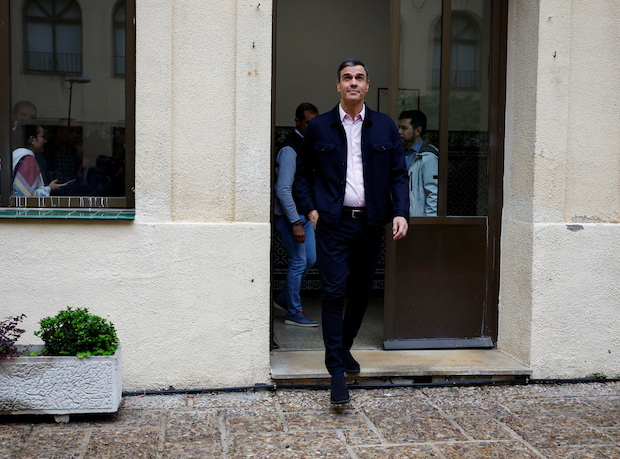Spain’s Sanchez gambles on snap election after regional ballot rout

Spain’s Prime Minister Pedro Sanchez appears after he casts his vote at a polling station during Regional elections, in Madrid, Spain, May 28, 2023. (Photo by JUAN MEDINA / Reuters)
MADRID — Spain’s Socialist Prime Minister Pedro Sanchez unexpectedly called a snap national election on Monday and his main rival spelled out the aim of becoming the country’s next leader after left-wing parties were routed in a regional ballot.
Sanchez, who had repeatedly said he wanted to see out a full term in office, portrayed Sunday’s crippling defeat as a clear vote of no confidence in his coalition government.
The mainstream conservative People’s Party (PP) of Alberto Nunez Feijoo won outright control of two regional administrations and could run six more in partnership with the far-right Vox, whose leader said he was ready to form coalitions with the PP. In all, 12 regions were contested.
Sanchez, saying he felt compelled to “take personal responsibility for the results”, called the national election for July 23.
The announcement – the biggest gamble in the career of a politician with a well-established reputation as a risk-taker – wrongfooted most of Sanchez’s government and even some members of his inner circle.
Article continues after this advertisementHe said he needed to “seek a clarification about the wishes of Spain’s people, a clarification about the political direction that the government should take, and about the political forces that should lead the country through that phase.”
Article continues after this advertisement“…I believe it is necessary to respond and submit our democratic mandate to the will of the people,” he said in a televised speech.
Sunday’s results indicate the PP and the far-right Vox could unseat Sanchez’s Socialist Workers’ Party (PSOE) if they replicated that performance at national level.
“The sooner (the election), the better,” PP’s Feijoo told a press conference, asking voters to give his party a “clear majority” to run the country.
“I ask Spaniards to make me Spain’s next prime minister,” he said, adding that he had held informal talks with Vox over the outcome of Sunday’s election.
Vox leader Santiago Abascal said his party was open “creating an alternative” to Sanchez by forming national and regional governing coalitions with the PP.
Far-right specter?
Sanchez had previously said the national election would be in December, and it is rare for a Spanish government to call a snap ballot after a poor regional election – especially when much of the country will be on holiday.
Pablo Simon, professor of political science at Madrid’s Carlos III University, said Sanchez’s strategy may be to rally support by raising the specter of a first far-right party in government since dictator Francisco Franco died in 1975, at a time when Spain will also hold the six-month EU presidency.
“If what he aspires to do is to mobilize the left with the fear of Vox, Vox’s negotiations with the PP during this whole period are going to be taking place during this time,” Simon said.
Sources close to the prime minister said almost no one within the government knew of his decision beforehand.
“The move has caught us by surprise, but now we know about it, it is the bold gesture we need to win,” said a senior government official.
David Hernandez Martinez, professor of international relations at Madrid’s Complutense University, said Sanchez had hoped to use Spain’s EU presidency to sell himself to voters as an international statesman, and “this puts a huge spanner in his plans.”
But the prime minister has become known for taking unexpected political risks.
He took office in June 2018 by winning the first no-confidence vote in Spanish history, removing PP Prime Minister Mariano Rajoy after negotiating a pact with Catalan and Basque pro-independence parties.
The fragility of his coalition government forced him to call snap elections twice in 2019.
On Sunday, while the PSOE dropped 400,000 votes compared to the 2019 local election according to official data, its far-left junior coalition partner Podemos lost ground across the board, further weakening Sanchez’s position.
Labor Minister Yolanda Diaz, Spain’s most popular politician according to polls, has been trying to form a coalition called Sumar to unite all of Spain’s left-wing parties but Podemos has yet to sign up. The parties now have just 10 days to register their alliance with electoral authorities.
Both the PP and the anti-immigration Vox meanwhile performed better than expected on Sunday.
The PP won an absolute majority in the capital Madrid while the Socialists lost control of Valencia, Aragon, and the Balearic Island, as well as their southwestern stronghold of Extremadura and the cities of Valencia and Seville.